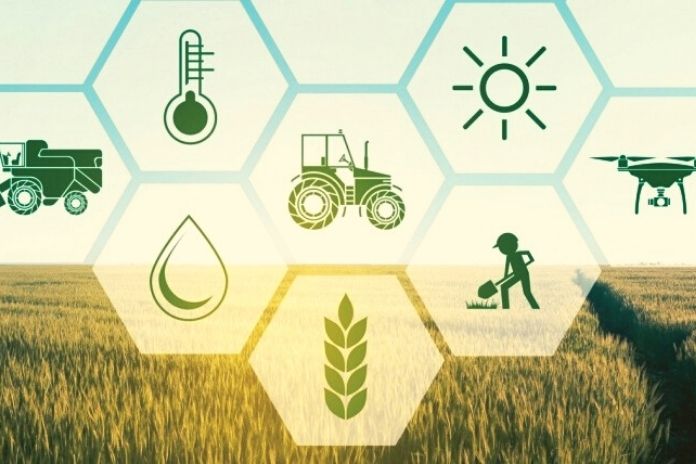Digital Agricultural Technology: Automated steering systems, integrated software solutions for farm management and agricultural machinery, ever more sophisticated sensors, and even more precise drives: the digital revolution has long been raging in the fields. However, without the many farmers who have so far spurned the high-tech systems.
Just like a pencil line along a ruler, the tractor traces its lanes, lane by road, to turn in the same arc at the edge of the field. The farmer sits onboard and operates the computer, but steering is done by a satellite-based automated system that controls an unscrewed tractor that follows slightly offset.
Modern agricultural technology is fully networked. Thanks to the Isobars industry standard, a lot of data traffic flows between tractors and attached machines from different manufacturers. Sensors monitor soil quality, weather conditions, and other parameters during the crossing. The onboard system compares them with historical data. It determines the proper control strategy for the partly electrically, partly hydraulically driven fertilizer spreader, sowing, tillage, and harvesting machines in almost real-time.
The data is transferred to the farm administration’s field and yield maps so that every step of the production chain is documented and the farmer can access the current state of the soil when planning his work. Such a digital soil memory helps large farms, in particular, to use fertilizers, pesticides, and seeds as sparingly as possible.
While agricultural machinery is communicating lively, many of his colleagues have fallen silent, who chairs the “Labor-Management and Process Technology” committee of the Agricultural Society. “For us farmers, it is a great challenge to master the variety of information and data.” “We are mostly silent in this phase because the technology offered still expects people to adapt to it – and not the other way around.” But farmers are used to pragmatic solutions that help them cope with work. There is still a lack of understanding between man and machine and user-friendliness.
Digital Agricultural Technology: Farmers: ITC In Agricultural Technology Fail Because Of High Acquisition Costs
When asked why management methods based on information and telecommunication technologies (ICT) find it difficult in the market, 60% of those questioned named the high acquisition costs.
But it doesn’t just fail because of money; The fear of operating errors caused by overwhelmed and changing drivers is just as often mentioned. Greater dependence on manufacturers and higher repair costs are also frequent motives. Every second respondent is unsure whether the investment in a system is future-proof. And to top it all, four-fifths of the respondents feel more or less badly advised in sales discussions.
Despite all the skepticism, the farmers are working intensively on the subject. Dozens of respondents took the opportunity to answer freely and specified their reservations about the high-tech systems. In farms up to 25 hectares, in particular, it is not economically viable. Others do not dare to leap in technology, doubt the compatibility with existing technology, miss training offers for themselves and their drivers, or complain about the cumbersome operation and data analysis. Instead of saving time, the systems need time in the beginning that farmers don’t have.
In addition, several respondents expressed doubts about the function on small, misshapen fields or slopes. And again and again, in the free answers, the desire for understandable model calculations appears to be able to assess the business benefits of the systems.
Survey On Modern Agricultural Technology: Many Farmers Are Unsure And Skeptical
The tenor: Many farmers feel uncertain and skeptical. However, the potential of agricultural engineering is undisputed. “The return on investment is excellent.”
Accordingly, the manufacturers of high-tech agriculture need to educate their customers and better train their salespeople to give well-founded advice to unsettled customers. “The sales process for agricultural machinery with elements of communication technology differs significantly from the sale of purely mechanical, hydraulic or 12 V electric agricultural machinery and tractors”. Because ICT solutions are neither visible nor tangible nor self-explanatory. Even demonstrating them in concrete terms is difficult. “Without the harvest, there is no presentation possible, and fertilizer cannot only be spread for demonstration purposes.” He sees the solution in the increasing use of video films and computer animation. Highly complex functions that are not visible on the device can only be conveyed virtually.
This can be seen from the increase in productivity over the past 200 years: Before mechanization, three farmers could feed one townspeople, 100 years later, one farmer could feed three townspeople, and today one farmer in this country feeds 140 townspeople. The growth goes hand in hand with the introduction of more complex, electronically controlled machines.
The Trend In Modern Agricultural Technology: Organic Computing
However, scientists are convinced that machines’ complexity does not necessarily have to result in a more complicated operation. “Progress is the path from the primitive to the complicated to the simple.” building on trends such as organic computing in agricultural engineering – behind which self-organizing control architectures capable of learning are hidden.
His chair provided a tractor with it. “The machine can generate suggestions for complex control tasks and recurring load cycles, to submit them to the operator or to optimize the function itself.” This shows that developers can also adapt highly complex technology to people. “The technology will be much less in the future – but instead talk in such a way that farmers understand it.”
ALSO READ: Big Data Is Primarily Intended To Improve Productivity

